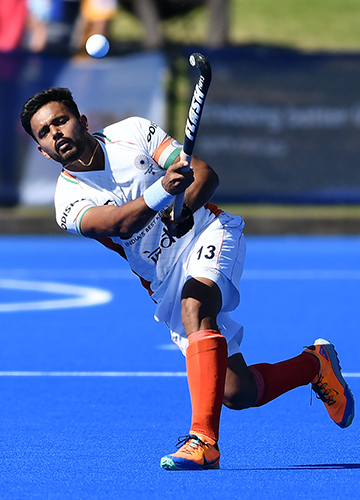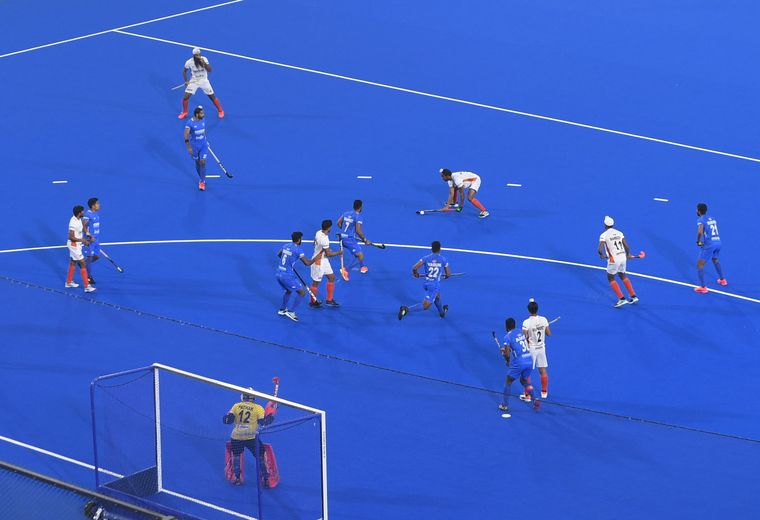THE INTERNATIONAL HOCKEY Federation describes him thus: “Harmanpreet Singh is a bona fide modern-day superstar. He is a terrific defender with a knack for being at the right place at the right time to break down the opponent’s offence.... And he scores goals, goals and more goals! To add to that impressive resume, he has now been voted the FIH Player of the Year for the second year running.”
Indeed he has. Albeit not as flamboyant as some of his predecessors, on or off the field, the captain has scored the most goals for India in the past two years or so, including at the Tokyo Olympics (six), and leads a team on the upswing into the World Cup starting January 13.
Having won an Olympic medal (bronze) after 41 long years in Tokyo, the team is up for an arguably sterner test. India last won a World Cup in 1975. The world of hockey has expanded and gotten more competitive since. “There is no pressure as such, but it is our responsibility,” the soft-spoken 27-year-old told THE WEEK. “Everyone knows we have done well at the Olympics, and that we can do the same in any major tournament. The boys are confident that we have worked hard. The World Cup is at home (Bhubaneswar and Rourkela), and this is a good chance to capitalise on that. We do not know when next we will play in front of home crowds. This is the time to create history.”
Harman, as he is fondly called, has no great hockey lineage to boast of. He comes from a farming family in Jandiala Guru, a village on the outskirts of Amritsar. At 15, he moved to Jalandhar to pursue his passion and joined the Surjit Academy. He rose up the junior ranks and entered the senior team relatively quickly. After an eventful journey on the field, seeing highs, lows and mediums, he replaced Manpreet Singh as captain this month.
“My focus is on continuing with the things that have been going well,” he said. “And these days, as a defender, you see they are minding long balls, etc. I have to keep my position free; the aim will be to keep a good connection with the defenders and the midfielders in my team.”
In many ways, this team is less bogged down by the weight of Indian hockey’s glorious past. Twelve of the 18 men in the squad had been part of the medal-winning performance at the Olympics. The team has a mix of youth—Jarmanpreet Singh (50 matches), Nilam Sanjeep Xess (34) and Jugraj Singh (28)—and experience—Manpreet Singh (314), P.R. Sreejesh (274) and Akashdeep Singh (218). Poacher Gurjant Singh and midfielder Sumit miss out because of injuries.
Reputations present and past, said chief coach Graham Reid, rarely matter in a World Cup. “There have been so many different results from different periods,” he told THE WEEK. “I think the top 10 of 16 teams could probably win. Teams work for years to build their best team for these competitions. So, every game you play at a World Cup or the Olympics is difficult.”
Reid would know. He was part of Australia’s bronze medal win at the 1990 World Cup and was assistant coach to the legendary Ric Charlesworth.
“We are preparing well,” he said. “We have been in Rourkela since December 27 and are getting used to the pitch and the hotel. It is a fantastic setup, seriously world-class. I think the most important thing is that we need to be playing at our best. If we do so, we can beat any team on any day. That has been the focus.”
The 16 teams are placed in four groups. India shares its pool, D, with Spain, England and Wales. The hosts’ opening match is against the Spaniards in Rourkela. “If you ask someone which game they want to play, probably everyone will say they want to play against India in India in the opening match of the World Cup,” said Spanish Captain Alvaro Iglesias. “It will be great. We have been training a lot together and we are waiting for the moment. We know the stadium in Rourkela is bigger. We know there will be a lot more people there. It will be hard to listen to our teammates and the instructions from the referee as well.”
Coach Max Caldas has been tightlipped about the challenge. Spain, despite its talent and fine record, is yet to win the World Cup. “I think it will be challenging for all to compete in Rourkela,” he said. “Because of the pandemic, we have forgotten how to play in front of big crowds. But we are not going to focus on that too much. We will focus on ourselves. It is a 16-team tournament. We are a young, fast team and we are going to stick to our guns and see how we go.”
Reid, too, is taking it one match at a time. “Every time you look at a particular pool, it is tough. Spain, England and Wales are all difficult opponents. We have played against them in the past, so we have an idea about them.”
Scoreboard pressure, said captain Harmanpreet, would be crucial. “[Group matches] will be tough because if you see the Pro League matches, we did not get any easy matches against Spain, England or Wales,” he said. “The starting five minutes are important as both teams usually get opportunities in this period. That will be the focus. We have to make the most of whatever opportunity we get in these initial moments. We have to either score or get a penalty corner. Defenders need to be alert and, even if we score, we must make sure the opponents do not score quickly.”
The team also knows not to get carried away by the home support. “It is a double-edged sword,” said Reid. “We are trying to take all that out of play and focus on what is in front of us. What is important is to go out and play well; the results will look after themselves.”
Sreejesh knows this well. India’s talismanic goalkeeper has been part of several World Cups and knows how tough they can be. He has been talking to the youngsters about what to expect. “The best part is that we are playing at home; that is an advantage,” he told THE WEEK. “Maybe it will be tougher for the youngsters, but I always tell them it is up to them how they deal with the crowd—whether they want it to be 12th man or the enemy. You cannot play according to the crowd. The best way is to just stick to your plans and stay as positive as you can. It is a good team and I hope, match by match, that the team will grow. We expect to create some history.”
The change in the format is a plus, he added. “One big difference is that the tournament is happening at two venues,” he said. “The best part is that the 2nd and 3rd team of a pool play crossover matches and so will get one more opportunity to get into the quarterfinals. The only difference between the top six teams will depend on who capitalises on opportunities and punishes the opposition’s mistakes. This is where we need to be more careful.”
Powerhouses Australia, Germany, Belgium and the Netherlands come on the back of strong performances. India, however, lost the recent Australia tour 1-4.The team, though, is not disheartened. Harmanpreet said the idea was to test the youngsters against a strong team and that he was satisfied with the results. “We showed that we are not scared or overawed by Australia,” he said. “We have created opportunities and scored goals against them. The main goal was to build confidence.”
Reid, meanwhile, has found a silver lining to the loss. “I was pretty happy that we scored four goals [in one match] against Australia,” he said. “Obviously, we let too many goals in, but we learnt a lot from that. Also, I was speaking to Bram Lomans from the Netherlands and he reminded me that the Dutch had won the World Cup at home after losing a series in Australia 1-4. It was nice to hear that!”



